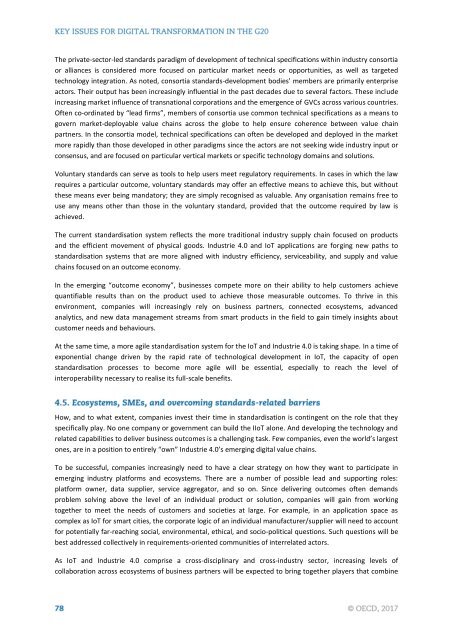KEY ISSUES FOR DIGITAL TRANSFORMATION IN THE G20
2jz0oUm
2jz0oUm
Create successful ePaper yourself
Turn your PDF publications into a flip-book with our unique Google optimized e-Paper software.
The private-sector-led standards paradigm of development of technical specifications within industry consortia<br />
or alliances is considered more focused on particular market needs or opportunities, as well as targeted<br />
technology integration. As noted, consortia standards-development bodies’ members are primarily enterprise<br />
actors. Their output has been increasingly influential in the past decades due to several factors. These include<br />
increasing market influence of transnational corporations and the emergence of GVCs across various countries.<br />
Often co-ordinated by “lead firms”, members of consortia use common technical specifications as a means to<br />
govern market-deployable value chains across the globe to help ensure coherence between value chain<br />
partners. In the consortia model, technical specifications can often be developed and deployed in the market<br />
more rapidly than those developed in other paradigms since the actors are not seeking wide industry input or<br />
consensus, and are focused on particular vertical markets or specific technology domains and solutions.<br />
Voluntary standards can serve as tools to help users meet regulatory requirements. In cases in which the law<br />
requires a particular outcome, voluntary standards may offer an effective means to achieve this, but without<br />
these means ever being mandatory; they are simply recognised as valuable. Any organisation remains free to<br />
use any means other than those in the voluntary standard, provided that the outcome required by law is<br />
achieved.<br />
The current standardisation system reflects the more traditional industry supply chain focused on products<br />
and the efficient movement of physical goods. Industrie 4.0 and IoT applications are forging new paths to<br />
standardisation systems that are more aligned with industry efficiency, serviceability, and supply and value<br />
chains focused on an outcome economy.<br />
In the emerging “outcome economy”, businesses compete more on their ability to help customers achieve<br />
quantifiable results than on the product used to achieve those measurable outcomes. To thrive in this<br />
environment, companies will increasingly rely on business partners, connected ecosystems, advanced<br />
analytics, and new data management streams from smart products in the field to gain timely insights about<br />
customer needs and behaviours.<br />
At the same time, a more agile standardisation system for the IoT and Industrie 4.0 is taking shape. In a time of<br />
exponential change driven by the rapid rate of technological development in IoT, the capacity of open<br />
standardisation processes to become more agile will be essential, especially to reach the level of<br />
interoperability necessary to realise its full-scale benefits.<br />
How, and to what extent, companies invest their time in standardisation is contingent on the role that they<br />
specifically play. No one company or government can build the IIoT alone. And developing the technology and<br />
related capabilities to deliver business outcomes is a challenging task. Few companies, even the world’s largest<br />
ones, are in a position to entirely “own” Industrie 4.0’s emerging digital value chains.<br />
To be successful, companies increasingly need to have a clear strategy on how they want to participate in<br />
emerging industry platforms and ecosystems. There are a number of possible lead and supporting roles:<br />
platform owner, data supplier, service aggregator, and so on. Since delivering outcomes often demands<br />
problem solving above the level of an individual product or solution, companies will gain from working<br />
together to meet the needs of customers and societies at large. For example, in an application space as<br />
complex as IoT for smart cities, the corporate logic of an individual manufacturer/supplier will need to account<br />
for potentially far-reaching social, environmental, ethical, and socio-political questions. Such questions will be<br />
best addressed collectively in requirements-oriented communities of interrelated actors.<br />
As IoT and Industrie 4.0 comprise a cross-disciplinary and cross-industry sector, increasing levels of<br />
collaboration across ecosystems of business partners will be expected to bring together players that combine


